Japan-Myanmar Relations
Mrs. Akie Abe, the Spouse of the Prime Minister of Japan, Visits Myanmar
November 21, 2014
From November 12 to 13, 2014, Mrs. Akie Abe, the spouse of Mr. Shinzo Abe, Prime Minister of Japan, accompanied her husband on a trip to the Republic of the Union of Myanmar, where he attended the ASEAN related Summit Meetings, and attended a variety of exchange activities.
1. November 12
(1) Visit to Yezin Agricultural University
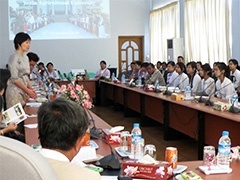
Mrs. Abe had her second opportunity to visit Yezin Agricultural University on the outskirts of Nay Pyi Taw, that is the only university specializing in agriculture in Myanmar, and met with the students and researchers after being welcomed by a large number of those concerned.
Mrs. Abe received explanations from the university’s students about their research interests in various fields including agricultural developments or agricultural economy, about their pathways after graduation, and exchanged views with them about situations of agriculture in Myanmar. In addition, with interests shown by a university instructor in Mrs. Abe’s project for the chemical-free agriculture in Japan, Mrs. Abe explained her project to produce the organic rice and also introduced the initiatives of Japan’s private-sector organizations (such as NPO Aida Ueyama Tanadadan).
Furthermore, Mrs. Abe received a message from Mr. U Myint Hlaing, Minister of Agriculture and Irrigation, stating “I am grateful for Mrs. Abe’s interest in Myanmar’s agriculture and for the Government of Japan’s grant aid to Yezin Agricultural University. I would like to express my gratitude for the supports from the people of Japan and promise to attentively utilize the supports for the development of Myanmar’s agriculture.”
(2) Visit to Keymartewin Monastery and Orphanage
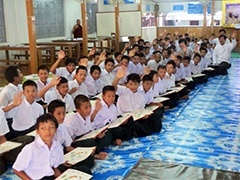
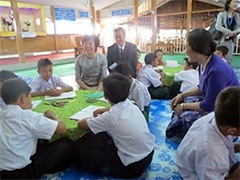
Mrs. Abe visited Keymartewin Monastery and Orphanage in Pyinmana City on the outskirts of Nay Pyi Taw, and shared some time with its staff and approximately 80 children who lived there. The facility accepts children from regions throughout Myanmar, including ethnic minorities, who are orphaned as a result of household poverty or the death of both parents.
Mrs. Abe communicated closely with many of the children about their interests in studies and future dreams, and enjoyed their singing for her.
2. November 13
(1) Visit to The Yangon Japanese School
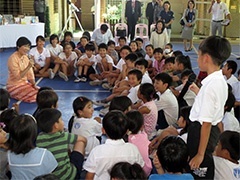
Mrs. Abe visited the Yangon Japanese School, which this year is celebrating its 50th anniversary of its foundation, and was welcomed by the children and students from the kindergarten, elementary and middle-school sections with the event of their performance such as singing cheerfully.
In her greeting at the school, Mrs. Abe said “Two things link this school with me. This school’s nameplate at the main gate was inscribed with calligraphic writing by my husband (Prime Minister Abe) on his visit to Myanmar last year. Furthermore, 31 years ago my husband’s father Shintaro Abe, who was Foreign Minister at the time, visited this school as well, and donated an astronomical telescope. I have learnt that it can no longer be used, and so today bring a new one from Japan in the hope it will help you in your studies,” and donated it. Mrs. Abe also donated books including Japanese culture, science and mathematics, as the ‘Akie Book Collection.’
Following that, Mrs. Abe enjoyed exchanging with the children and students , and listened to their school life, way of study and future dreams.
(Reference) “Akie Book Collection”
Mrs. Abe, with the cooperation of relevant organizations, donates Japan-related books and Japanese language teaching materials to educational institutions and other entities that hold Japanese language and culture classes in the countries where she visits, in the hope that it will encourage further exchanges and promotion of Japanese language learning and culture in those countries.
(2) Meeting with Japanese women ofInternational Organizations and NGOs in Myanmar
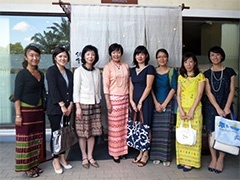
In Yangon, Mrs. Abe met with Japanese women who are actively working for international organizations and NGOs in Myanmar.
In the meeting, Mrs. Abe said that “In Japan, further utilization of women’s strengths is an important challenge, and I believe that here in Myanmar also, women have potential to perform important roles with their inherent female characteristics,” and they frankly exchanged views regarding their everyday efforts and difficulties.
(3) Visit to The Yangon University for Foreign Languages
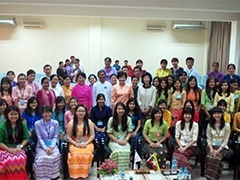
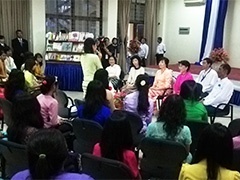
Mrs. Abe visited the Yangon University for Foreign Languages and had a meeting with officials concerned and students of the Japanese language department after a welcome ceremony.
In response to a welcoming address from Myo Han, Vice-Chancellor of the University, Mrs. Abe said “It is my hope that Japan and Myanmar joins hands together as important friends and promotes mutual cooperation.”
In addition, Mrs. Abe donated the university with Japanese books, including Japanese language learning materials, as the ‘Akie Book Collection.’
(4) Visit to JICA’s Project site of the “Capacity Improvement of Recovery and Reintegration Assistance for Trafficked Persons”
Mrs. Abe visited the site of JICA’s “Project on Capacity Improvement of Recovery and Reintegration Assistance for Trafficked Persons” in Yangon and the “Support and Information Center”, and received explanations from JICA experts, the center staff and users regarding the current situation of the human trafficking issues in Myanmar with its neighbour countries, such as sexual exploitation, forced marriages and migrant worker related problems , and also regarding the center’s initiatives for these issues.
This project is to build up capacities of those who support reintegration of human trafficking victims into the society and to strengthen the Center’s capability of information-gathering.
(5) Visit to Shwehinthar Yelay Monastery
Mrs. Abe visited Shwehinthar Yelay Monastery in Yangon to look around its facilities for HIV patients over receiving the explanation, and also listened to the facility users’ experiences.
Shwehinthar Yelay Monastery is located near a hospital specializing in infectious diseases, especially HIV, which offers livelihood supports including providing places to accommodate HIV patients who need medical care at the hospital and their families from all over the country.
(6) Meeting with Myanmar women
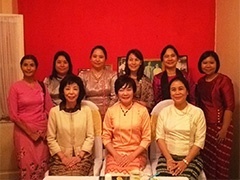
In Yangon Mrs. Abe met with six Myanmar women from various fields such as business, media and sports.
These participants expressed their gratitude for the opportunity to convey the “real voice” of Myanmar, and introduced their initiatives in their own fields and the current situation for working women in Myanmar. Mrs. Abe replied that she hopes Japan and Myanmar to join hands to tackle common challenges in order to achieve “societies in which all women shine.”

